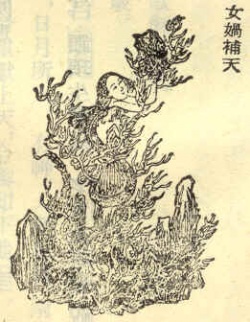Nü Wa 女媧
Nü Wa 女媧 is a female mythical creator deity and one of the mythical Three Augusts 三皇, for which reason she is sometimes called Nü Huang 女皇 "Female Emperor". She had the body of a snake yet the head of a woman and was able to transform into different forms seventy times a day. In Han period 漢 (206 BCE-220 CE) stone brick pictures, the upper half of her body is human, while the lower part is that of a snake. She wears clothes and a hat. She is regulary portrayed together with the creator deity Fu Xi 伏羲, who had a similar shape. Their tails intertwine each other in the common portraits. The Han period book Fengsu tongyi 風俗通義 says that in the beginning, just when Heaven and Earth had separated, Nü Wa formed humans out of mud. According to popular mythology, Nü Wa and Fu Xi were sister and brother but became wife and husband and gave birth to the human race. The Tang period 唐 (618-907) narrator Li Rong 李冗 says in his book Duyizhi 獨異志 that Nü Wa, ashamed of accomplishing unity with her brother, felt ashamed and covered her face (? mian 面) with a fan made of grass. According to the book Huainanzi 淮南子, the Yellow Emperor 黃帝 supported Nü Wa in the creation of men by forming their organs, Shang Pian 上駢 shaped eyes and ears, and Sang Lin 桑林 arms and shoulders. Nü Wa is not only seen as the mother of mankind, but also as the inventor of matrimony. Another story recorded in the Huainanzi narrates how Nü Wa repaired the sky when it obtained cracks and threatened to implode. At that moment fire and water destroyed the landscape and birds and beasts devoured humans. Nü Wa melted down five different kinds of stone and filled with it the cracks in the sky. The legs of a turtle were used to form the four poles, and the ash of reed was able to dam the floods. She also killed a black dragon to level the valleys. When this work was done, her bowels gave birth to ten deities that were to take care for all parts of the earth. She thereupon ascended to Heaven where she was allowed to repose at the side of the Celestial Emperor (Tiandi 天帝).
Sources:
- Li Jianping 李劍平 (ed. 1998). Zhongguo shenhua renwu cidian 中國神話人物辭典, p. 42. Xi'an: Shaanxi renmin chubanshe.
- Xiong Tieji 熊鐵基, Yang Youli 楊有禮 (ed. 1994). Zhongguo diwang zaixiang cidian 中國帝王宰相辭典, p. 4. Wuhan: Hubei jiaoyu chubanshe.
- Yuan Ke 袁珂 (ed. 1985). Zhongguo shenhua chuanshuo cidian 中國神話傳說詞典, p. 43. Shanghai: Shanghai cishu chubanshe.
